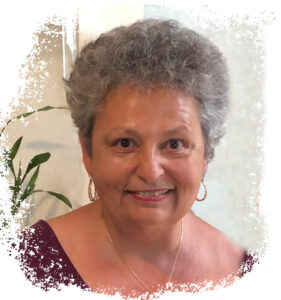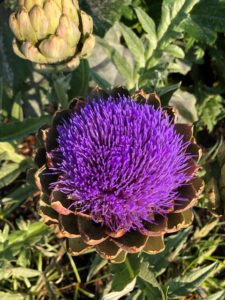As the body changes what is left is soul.
The Bloom of an Artichoke
 I walk out into the cool, misty morning, unusual for late August in California. I turn the corner to walk down the short path to the golf cart with my wife, Sandy. BAM! Out of the corner of my eye I glance over to see a flower, so unique and beautiful, that I fall under its spell. I practically leap over to this small patch of garden space. Behold, a purple bloom, 6 inches across with almost iridescent, lavender-blue, thistle like centers is emerging out of the head of an artichoke.
I walk out into the cool, misty morning, unusual for late August in California. I turn the corner to walk down the short path to the golf cart with my wife, Sandy. BAM! Out of the corner of my eye I glance over to see a flower, so unique and beautiful, that I fall under its spell. I practically leap over to this small patch of garden space. Behold, a purple bloom, 6 inches across with almost iridescent, lavender-blue, thistle like centers is emerging out of the head of an artichoke.
“Do you see this? I ask Sandy who is standing beside me.
“Yes, it’s beautiful,” she says, looking into the deep purple, unaware I am having an epiphany.
“I’ve never seen anything like this!” I say, examining the sharp, pointed edges of artichoke petals, that once hugged the plant like armor, but now has opened, in complete abandon, to its flowering destiny.
Artichokes remind me of Parkinson’s. The symptoms of stiffness, rigidity, and a closing into itself with smaller and smaller  movements seem similar to the tightly wrapped artichoke. But artichokes are an exception in the garden. When left unpicked the edible buds open into a spectacular flower.
movements seem similar to the tightly wrapped artichoke. But artichokes are an exception in the garden. When left unpicked the edible buds open into a spectacular flower.
There are people who blossom with Parkinson’s. They are called positive deviants. They can be observed in every community as certain individuals or groups that find better solutions to problems than their peers. Dr. Laurie Mischley, naturopath, and researcher seeks an answer to this question: “Among those with Parkinson’s who are doing unusually well, what are they doing differently?”
I wonder, what accounts for Jimmy Choi’s remarkable prowess? He turned his early-onset Parkinson’s diagnosis at 27 into being a four-season veteran of American Nija Warrior and marathon runner.
Just like a powerful life force runs wild in the garden, God’s gallery of fruition, that invisible power shows up as the outliers of Parkinson’s. People are defying old expectations of PD. Transformation is possible. Flowering happens.
**
For more information on the Pro PD study by Dr. Laurie Mischley, and learning more about how exercise, lifestyle, nutrition, and social support contributes to living well with Parkinson’s contact Dr. Laurie Mischley, naturopath doctor and researcher at Education is Medicine.
Bio
Sage Bennet, Ph.D lives in Laguna Woods with her wife, Sandy, and their two dogs, Chloe and Freddy. She teaches philosophy and world religions online and is the author of Wisdom Walk: Nine Practices for Creating Peace and Balance from the World’s Spiritual Traditions. Please send comments to [email protected].
